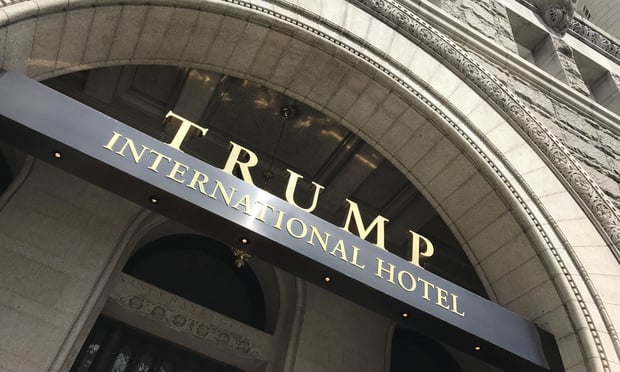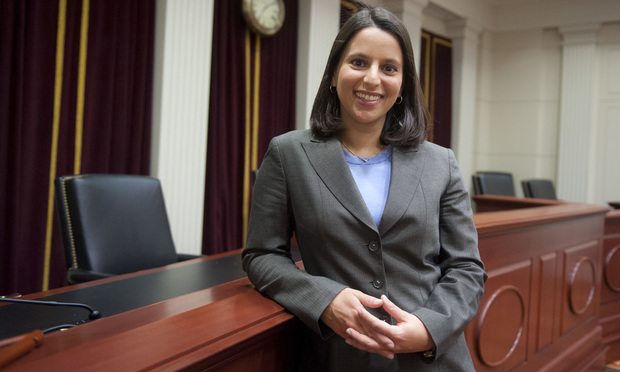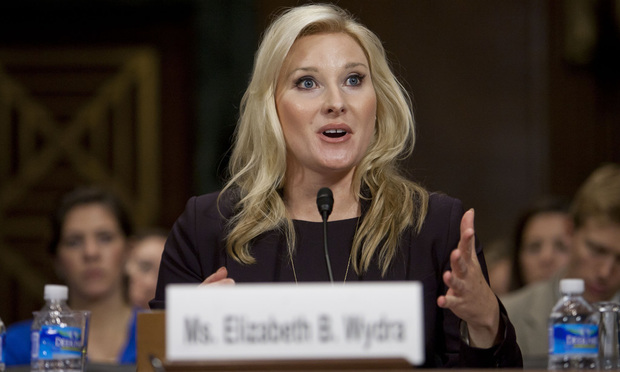It's Emoluments Week in US Appeals Courts: Meet the Lawyers Arguing
DOJ's Hashim Mooppan, a former Jones Day partner, will argue within a span of days in the D.C. and Fourth circuits. He faces Elizabeth Wydra, the president of the Constitutional Accountability Center, and Loren AliKhan, the District of Columbia solicitor.
December 06, 2019 at 04:40 PM
6 minute read
 Trump International Hotel in Washington, D.C. Photo by Michael A. Scarcella/ NLJ
Trump International Hotel in Washington, D.C. Photo by Michael A. Scarcella/ NLJ
Two federal appeals courts this week will hear claims that Donald Trump is violating the U.S. Constitution's restrictions on presidents receiving gifts from domestic and foreign sources, provisions that were designed to limit outside influence in the White House.
The U.S. Court of Appeals for the D.C. Circuit on Monday will hear the case Blumenthal v. Trump, where Democrats in June 2017 sued the president. Then on Thursday, the Fourth Circuit, sitting en banc in Richmond, Virginia, will hear a case brought by the attorneys general for the District of Columbia and Maryland.
Both appeals courts plan to provide a real-time audio stream, which is routine for the D.C. Circuit since 2018 but still a rarity in the Fourth Circuit. Either or both of the cases, part of a wave of litigation confronting the secrecy of Trump's financial information and alleged conflicts of interest stemming from the president's business empire, could reach the U.S. Supreme Court in the coming months, but perhaps not be heard this term. And it's an open question how any ruling against Trump would be enforced.
The D.C. Circuit and Fourth Circuit cases confront constitutional clauses that broadly prohibit any officer of the U.S. from accepting a gift from foreign and domestic sources. The Fourth Circuit in July dismissed the case against Trump, but the full appeals court later voted to rehear the claims. In both cases, Justice Department lawyers have asserted there is no viable claim against Trump.
What follows is a snapshot of the government and private lawyers making their cases either for or against Trump.
 Gregory Katsas, left, Michael Carvin, center, and Hashim Mooppan, right. Credit: Diego M. Radzinschi / ALM
Gregory Katsas, left, Michael Carvin, center, and Hashim Mooppan, right. Credit: Diego M. Radzinschi / ALM>> Hashim Mooppan, a deputy assistant attorney general at the U.S. Justice Department: The former Jones Day partner will argue in both the D.C. Circuit and Fourth Circuit cases on behalf of the Trump administration. Mooppan is a Trump-era leader in the Justice Department's civil division. He is called on to argue some of the most closely watched cases. In 2017, he unsuccessfully tried to convince the Second Circuit in New York that federal civil rights laws don't protect gay and lesbian workers from discrimination; that case is now at the U.S. Supreme Court. He argued against the single-director structure of the Consumer Financial Protection Bureau, and in October he urged the D.C. Circuit to reject House Democrats' bid for documents concerning Trump's hotel in downtown Washington. Mooppan argued the earlier Fourth Circuit emoluments case for Trump. Mooppan was part of a wave of Jones Day lawyers who joined the Trump administration in early 2017. He first worked at the Trump White House with former Jones Day partner Gregory Katsas, who has since been confirmed as a judge on the D.C. Circuit. Mooppan has worked on the emoluments cases with Martin Totaro, who jumped from the U.S. Securities and Exchange Commission to the DOJ civil staff this summer. A private lawyer for Trump, Patrick Strawbridge of Washington's Consovoy McCarthy, will also make arguments on Thursday. Strawbridge is a former clerk to Justice Clarence Thomas.
 Loren AliKhan. Courtesy photo.
Loren AliKhan. Courtesy photo.>> Loren AliKhan, solicitor for the District of Columbia: AliKhan has served as the District of Columbia's top appellate lawyer since March 2018, when she was named solicitor under the leadership of D.C. Attorney General Karl Racine. AliKhan had been deputy solicitor since 2013. She was an O'Melveny & Myers appellate lawyer prior to her move to the District of Columbia attorney general's office. AliKhan argued the earlier emoluments case in the Fourth Circuit, and will now get a second chance on Thursday to make her case. AliKhan spoke recently about the dearth of women arguing at the U.S. Supreme Court. "Clients aren't, especially in the big corporations, that keen to take a chance on a more junior advocate," AliKhan said. "I think especially they are not as keen to take a chance on a more junior female advocate." She noted that many "repeat players" at the court have gone on to other jobs. Cornelia Pillard, Patricia Millett and Pamela Harris are all now federal appeals judges, AliKhan pointed out. Harris, formerly an O'Melveny & Myers partner and Georgetown University Law Center professor, will make an appearance Thursday as she now sits on the Fourth Circuit. AliKhan has worked on the emoluments case with a team from the Maryland attorney general's office, and also with private counsel Gupta Wessler PLLC and Cohen Milstein Sellers & Toll. Also arguing on Thursday: Leah Tulin, an assistant attorney general for the state of Maryland. Tulin is a former Jenner & Block partner in Washington.
 Elizabeth Wydra, chief counsel at the Constitutional Accountability Center. Photo by Diego M. Radzinschi/ ALM
Elizabeth Wydra, chief counsel at the Constitutional Accountability Center. Photo by Diego M. Radzinschi/ ALM>> Elizabeth Wydra, president of the Constitutional Accountability Center: Wydra will argue on behalf of congressional Democrats in the D.C. Circuit. Wydra was previously at Quinn Emanuel Urquhart & Sullivan, where she worked in the Supreme Court and appellate practice chaired by name partner Kathleen Sullivan. Wydra speaks often at progressive and conservative legal groups, and she often files friend-of-the-court briefs in the U.S. Supreme Court. She appeared at a Federalist Society panel in November with Judge Amul Thapar of the U.S. Court of Appeals for the Sixth Circuit, where she discussed some of the political aspects behind originalism. "[F]rankly, the idea that only conservatives are originalists and liberals aren't is just wrong, and you can look at the Supreme Court to see that," Wydra said. "You can disagree with the way that folks on one side or the other apply it, but as we've heard from Justices Kagan and Ginsburg, if you're talking about looking to the text and history of the Constitution, they're originalists too, and they've said that at various points." Wydra has worked on the emolument case with Brianne Gorod, chief counsel at the Constitutional Accountability Center and a former O'Melveny counsel, and Brian Frazelle, an appellate counsel at the Constitutional Accountability Center.
Read more:
Hundreds of Law Profs Declare Trump's Conduct 'Clearly Impeachable'
O'Melveny Snags Michael Dreeben, Former Longtime Deputy Solicitor General
At the Supreme Court, Where Are the Women Advocates?
16 Conservative Lawyers Say They Support 'Expeditious' Impeachment Inquiry
This content has been archived. It is available through our partners, LexisNexis® and Bloomberg Law.
To view this content, please continue to their sites.
Not a Lexis Subscriber?
Subscribe Now
Not a Bloomberg Law Subscriber?
Subscribe Now
NOT FOR REPRINT
© 2025 ALM Global, LLC, All Rights Reserved. Request academic re-use from www.copyright.com. All other uses, submit a request to [email protected]. For more information visit Asset & Logo Licensing.
You Might Like
View All

'A Warning Shot to Board Rooms': DOJ Decision to Fight $14B Tech Merger May Be Bad Omen for Industry

'Incredibly Complicated'? Antitrust Litigators Identify Pros and Cons of Proposed One Agency Act
5 minute readLaw Firms Mentioned
Trending Stories
- 1Big Law Partner Co-Launches Startup Aiming to Transform Fund Formation Process
- 2How the Court of Public Opinion Should Factor Into Litigation Strategy
- 3Debevoise Lures Another SDNY Alum, Adding Criminal Division Chief
- 4Cooley Promotes NY Office Leader to Global Litigation Department Chair
- 5What Happens When Lateral Partners’ Guaranteed Compensation Ends?
Who Got The Work
J. Brugh Lower of Gibbons has entered an appearance for industrial equipment supplier Devco Corporation in a pending trademark infringement lawsuit. The suit, accusing the defendant of selling knock-off Graco products, was filed Dec. 18 in New Jersey District Court by Rivkin Radler on behalf of Graco Inc. and Graco Minnesota. The case, assigned to U.S. District Judge Zahid N. Quraishi, is 3:24-cv-11294, Graco Inc. et al v. Devco Corporation.
Who Got The Work
Rebecca Maller-Stein and Kent A. Yalowitz of Arnold & Porter Kaye Scholer have entered their appearances for Hanaco Venture Capital and its executives, Lior Prosor and David Frankel, in a pending securities lawsuit. The action, filed on Dec. 24 in New York Southern District Court by Zell, Aron & Co. on behalf of Goldeneye Advisors, accuses the defendants of negligently and fraudulently managing the plaintiff's $1 million investment. The case, assigned to U.S. District Judge Vernon S. Broderick, is 1:24-cv-09918, Goldeneye Advisors, LLC v. Hanaco Venture Capital, Ltd. et al.
Who Got The Work
Attorneys from A&O Shearman has stepped in as defense counsel for Toronto-Dominion Bank and other defendants in a pending securities class action. The suit, filed Dec. 11 in New York Southern District Court by Bleichmar Fonti & Auld, accuses the defendants of concealing the bank's 'pervasive' deficiencies in regards to its compliance with the Bank Secrecy Act and the quality of its anti-money laundering controls. The case, assigned to U.S. District Judge Arun Subramanian, is 1:24-cv-09445, Gonzalez v. The Toronto-Dominion Bank et al.
Who Got The Work
Crown Castle International, a Pennsylvania company providing shared communications infrastructure, has turned to Luke D. Wolf of Gordon Rees Scully Mansukhani to fend off a pending breach-of-contract lawsuit. The court action, filed Nov. 25 in Michigan Eastern District Court by Hooper Hathaway PC on behalf of The Town Residences LLC, accuses Crown Castle of failing to transfer approximately $30,000 in utility payments from T-Mobile in breach of a roof-top lease and assignment agreement. The case, assigned to U.S. District Judge Susan K. Declercq, is 2:24-cv-13131, The Town Residences LLC v. T-Mobile US, Inc. et al.
Who Got The Work
Wilfred P. Coronato and Daniel M. Schwartz of McCarter & English have stepped in as defense counsel to Electrolux Home Products Inc. in a pending product liability lawsuit. The court action, filed Nov. 26 in New York Eastern District Court by Poulos Lopiccolo PC and Nagel Rice LLP on behalf of David Stern, alleges that the defendant's refrigerators’ drawers and shelving repeatedly break and fall apart within months after purchase. The case, assigned to U.S. District Judge Joan M. Azrack, is 2:24-cv-08204, Stern v. Electrolux Home Products, Inc.
Featured Firms
Law Offices of Gary Martin Hays & Associates, P.C.
(470) 294-1674
Law Offices of Mark E. Salomone
(857) 444-6468
Smith & Hassler
(713) 739-1250









